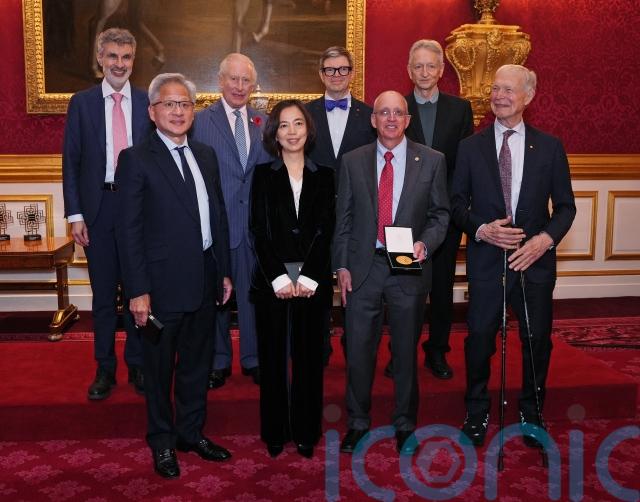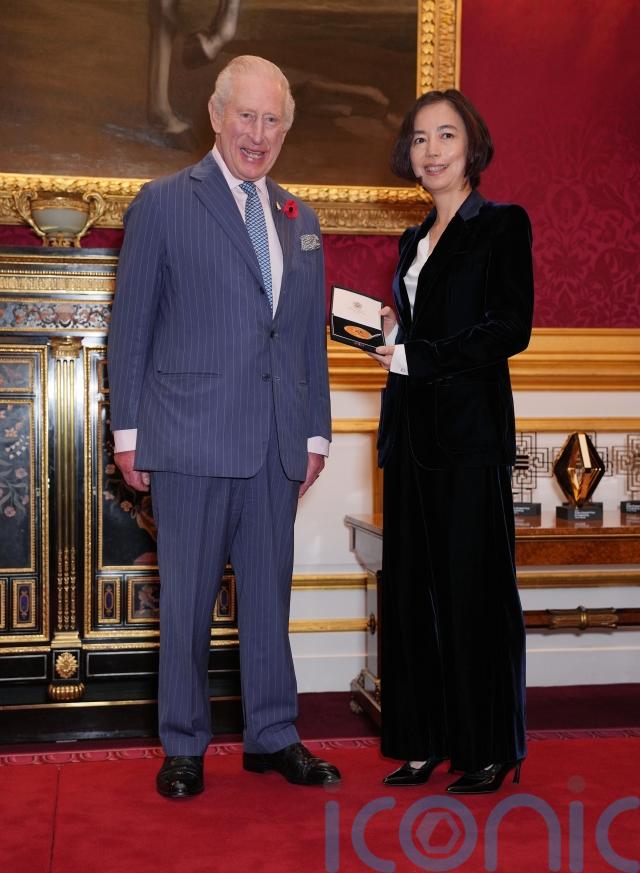
The King has discussed the risks of artificial intelligence (AI) with Nvidia’s founder at an awards ceremony for the leaders in the field.
Charles presented the 2025 Queen Elizabeth Prize for Engineering (QEPrize), likened to the “Nobel prize” of the industry, to seven people who have innovated modern machine learning.
Jensen Huang, founder and chief executive of the world’s most valuable company, Nvidia, was among those to receive trophies from the King.
Chinese-American computer scientist Professor Fei-Fei Li, who worked on “teaching computers to see”, was the only woman among the recipients.
Meanwhile, Andrew Garrad and Henrik Stiesdal were awarded 2024 QEPrizes for advancing the design, manufacture and deployment of modern wind power technology.
“I need to talk to you” was the first thing Charles told Mr Huang at the St James’ Palace event, said the businessman, who is one of the world’s richest men.
The King then handed him a message he had delivered to the 2023 AI safety summit at Bletchley Park, Buckinghamshire.
Mr Huang told reporters: “The King, surprisingly, he reminded me that he wanted to talk to me the last time I was here doing the state dinner, and there was something that he wanted to talk to me about.
“And as I saw him today, the first thing is he said (was) ‘I need to talk to you’.”
He continued: “And as (Charles) came up to me, he said, ‘there’s something I want to talk to you (about)’ and he handed me a letter, and this is a speech on AI safety.
“He obviously cares very deeply about AI safety – he believes in the power of the technology, the incredible capability to revolutionise UK and the world, but he also wants to remind us that the technology could be used for good and for evil, and so to make sure that we do everything we can to advance AI safety as we advance AI for good.”
Asked if the King uses AI, Mr Huang said “I’m going to read that letter thoroughly”, before adding that he himself uses multiple AI softwares every day.
Mr Huang said he uses the software for “second opinions” and takes an answer from one model and asks another model to “critique it”, which he advised everyone to do.

During a discussion with some of the winners, the King warned “there’s a lot of bad actors around”.
He added that the rate new technologies are emerging at is “just rapid”.
After receiving her award, Prof Li told reporters that she had briefly spoken with Charles about ensuring the technology is “doing good for people, and (making) sure we’re aware of the risks”.
“He’s such a friendly person and he’s obviously aware of this technology and aware of its human impact”, she said.
The scientist continued: “AI is a very powerful technology – as all powerful technologies are, they’re a double-edged sword.
“I think it’s important that we recognise how much benefit it potentially has for healthcare, education, manufacturing and many things.
“But also there are risks: Jobs will be shifting, it will impact different industries in very different ways, whether it’s … from deep fakes to its ability to make decisions”.

The professor emigrated from China at 15 years old and had always held a fascination with science, particularly physics.
She majored in physics at Princeton University and had a “defining moment” when, at around the turn of the century, she shifted her interests towards the science of intelligence.
The other QEPrize 2025 winners included professors John Hopfield, Yoshua Bengio and Geoffrey Hinton, and Meta’s chief scientist, Yann LeCun.
They were honoured for worked on turning computing systems inspired by the human brain into machine learning models.
Mr Huang and Dr Bill Dally, Nvidia’s chief scientist, were honoured for developing hardware platforms to help operate machine learning algorithms.
Dr Li received the trophy for establishing the importance of providing high quality datasets to track algorithms’ progress and train them.
The 2024 and 2025 trophies were designed by two young men, who travelled to St James’ Palace from India, after winning a Create the Trophy competition.
Previous QEPrizes recipients include engineers for developing the internet in 2013 and one engineer who developed the world’s strongest magnet in 2022.
Subscribe or register today to discover more from DonegalLive.ie
Buy the e-paper of the Donegal Democrat, Donegal People's Press, Donegal Post and Inish Times here for instant access to Donegal's premier news titles.
Keep up with the latest news from Donegal with our daily newsletter featuring the most important stories of the day delivered to your inbox every evening at 5pm.